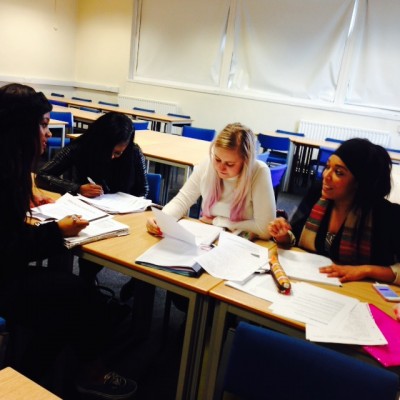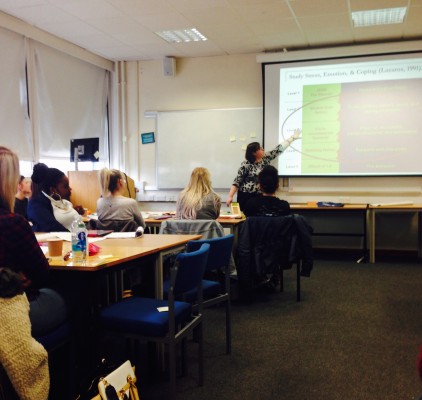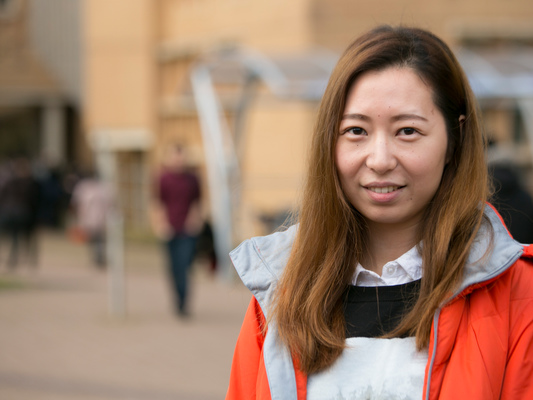International student ambassador Olivia Yuan Tian is originally from China. Here, she offers her advice to international students who are starting, or thinking about studying at Coventry University. In this guest blog, Olivia shares her advice to new international students on how to get the best out of an English lecture. She covers everything from how to prepare for a lecture to conquering language barriers, creating a study-life balance and perfecting exam revision…
For the Chinese students about to start studying abroad, the mood is undoubtedly an excited one. We can begin to look forward to freedom, without the control of parents. However, throughout our childhood, Chinese parents have always said:
No pain, no gain!”
“If you cannot get a degree, you cannot find a job. Your life is going to be ruined.”
Some of you may feel pressured to do well because of this. You may be worried about how to study in the UK or how to handle exams. Even if your IELTS scores or language scores have reached the requirements of the university, you may still feel unconfident in an English-speaking environment. You might find yourself worrying that you cannot keep up with the progress of the course. At first, I definitely struggled to study. But I have now learned some important skills to improve the process of studying and revising. The key thing is to make a resolution to study hard and identify a learning method that works best for you.

- Olivia and friends
Before the lecture: preparation is very important!
You may have heard this many times, and although it sounds simple, it is very difficult to achieve. I am ashamed to say that I have often ignored this advice, generally because I wanted to watch one more episode of my favourite TV show! Whilst I understand how easy it is not to prepare, I also recognise how scary it is to enter the lecture room unprepared! You’ll love the amazing feeling you get when you know you have prepared – it is definitely worth it!
Most courses at British universities are divided into lectures and seminars. The former is a formal lecture, whereas the seminars provide time to discuss and debate. Any problems that students may have in understanding a particular lecture can be addressed in these seminars, allowing students to ensure that they fully understand the subject. You can often find the PowerPoint on ‘Moodle’ before the lecture. This is when you should not be lazy; download it and print it out.
The first thing you need to do is to check that you understand all of the words used, then identify the points of the lecture and highlight anything that you do not understand. Based on this, you’ll know which parts of the lecture are most important to you, and what you need to be asking during the seminar. Keep the PowerPoints, as they are good review material before exams. I believe many students like me have the same experience: you do not have time to look-up unfamiliar English terms during the lecture, and then more and more new words show up during the session. In this case, our thinking speed cannot always keep up with the speed of the professors’ explanation. But as long I have prepared, I have a much better chance of understanding the lecture.

During the lecture: make notes and do not be shy to ask questions.
Properly preparing will mean that you are more confident in the lecture theatre. You can bring the print out to the lecture, so you do not need to worry about writing down all of the content. Highlight the main points as they are discussed and the areas where you need to find more information to help you fully understand. Some students are too shy to ask questions during the lecture. Don’t worry. The professors are very nice and willing to answer questions. If you feel really embarrassed to ask in front of other students, make sure you mark the question on your notes and ask the professor after the lecture.
After the lecture: make use of all the learning resources at the University.
Library resources should be fully utilised, whether you are writing a paper or holding group discussions. It’s important that you get into the routine of reading the PowerPoint again after the session, and then reviewing your own notes before going to the library to look for relevant information. There is a reading list in each module’s handbook. I know a lot of international students may worry when someone mentions reading, especially English books.

My reading tips:
Start at the introduction, then read the titles of each chapter and then jump to the conclusion. You can probably work out the context of the entire article this way. Then, as long as you prepared well before the lecture, you will be able to clearly identify the areas you need to read about, and can list which chapters you want to read – rather than having to read the whole book. This way you do not need to worry about struggling to find relevant information for your final essay.
It’s not just about studying:
In addition to studying in the UK, I also suggest that you experience some other activities, such as volunteer work or getting a part-time job. This is a very good opportunity to make friends with local people and get to know more about British culture. Your life in the UK is not just about studying, go out and explore! Accumulate new life skills and work experiences. If you want to find a job here when you finish your study, having work experience on your job application is much more important than you thought. It will make you stand out from other candidates, especially having done voluntary or charity work.

Finally
I would like to emphasise that we are very fortunate to come to England; to experience the different customs first hand and have better language-learning environment than those living at home. Make good use of this opportunity, become friends with both international and native speakers to better understand the British way of life and their multi-thinking mode. You’ll learn to make reasonable adjustments to your study techniques, and how to balance study with socialising. This means that you can have a fun life here and at the same time get a good degree! I hope you enjoy your life in the UK!

This post was written by international blogger Olivia studying Childhood and Youth Studies. Olivia has kindly provided the following translation of her blog post:
Translation:
考文垂的学习生活
对于第一次出国留学的中国学生来说,心情无疑是激动的,兴奋的! 没有了父母贴身的管束,瞬间开始憧憬自由自在的逍遥生活。但作为一个从小就在爸妈“学习很重要,要好好学习,不学习没有未来”这样一句句督促下长大的小孩,来英国前也多少会条件反射的担心“在英国上学要怎么学啊,英国大学生都怎么应付考试啊”等等一系列问题。其实真正来到英国以后现实更加残酷,就算你的雅思分数、语言成绩已经达到了学校的要求,但是还是会发现自己适应不了全英文的课堂语言环境,无法跟上课程进度。以前总说中国学霸个个埋头苦学,外国学霸个个喝酒泡吧,来了英国才知道,其实他们只是比我们更懂得如何安排时间而已。我绝对不是学霸,自认为在学习上没有任何天赋,但来了这边两年也算实践了一些前辈们授予的学习技巧,其实就是看你有没有想要好好学习的决心,在学习的过程中慢慢摸索,找到一个最适合自己的学习方法。
课前: 预习很重要!
这个看起来很简单,也听过很多遍,但是真正能坚持做到不是那么容易的一件事,很惭愧的说我也有很多时候因为想多看一集电视剧而把这一步省掉,但就是因为这样,更能体会到预习过后听课的感觉和没有预习时是决然不同的!英国大学的课程主要分为lectures和seminars。前者就是我们平时上的专业课程,后面就是讨论课,由老师带领大家复习和交流所学到的新知识,自我感觉seminar还是挺有用的,有些专业课上不是完全明白的问题,在这里可以通过讨论和实例得到充分理解。一般每个老师都在课前就把PPT上传到moodle上,这就是你不能犯懒的时候,空出一点看电视剧玩游戏逛街的时间,赶紧下载最好能打印出来,上课就靠这些东西了,而且它对你之后的考试和学期论文也很有帮助。我们要做的首先就是查生词了,划出这堂课的重点并且把你不懂的地方标注出来,这样上课时就可以有针对性的听一下老师的解释。相信很多和我一样的学渣都有这样的体会:上课时听到不懂的单词还没来得及查字典就又接连出现了更多听不懂的单词,以至于自己的思路始终跟不上老师讲解的速度。但只要有预习,上课时我的身子板也坐的直一些。
课中:勤做笔记,厚着脸皮提问题
课前预习做好了,上课时也会更有信心一些。可以上课时把你事先打印好的课堂讲义带上,就不需要在上课时着急抄下所有讲义上的内容,只需划出重点就好,对于自己需要课后再着重查资料帮助理解的地方一定要标注出来。对于老师的讲解可以直接用中文写下补充说明,我的笔记本上就是英文中文交叉着来,反正笔记是自己看,怎么方便理解怎么记。有些中国学生不太敢在课堂上提问题,其实国外的学生都是有问题就会马上举手示意说出来的,老师都很和蔼也很乐于回答学生在课堂上提出的问题,如果你实在跟我一样脸皮太薄,那就记得标注好,一下课马上拦住老师问问看。
课后:运用学校的各种学习实践资源
大家都知道的上完课最重要的是复习,拿出自己的笔记再翻翻看,去学校的图书馆找找相关资料,每个学科的handbook的后面都会列出必读和选读的书单,我知道很多学生一提到看书就头疼,而且还是英文书,其实看书也有看书的技巧,我觉得可以从介绍入手,然后跳到每个章节的大小标题再到最后的结论,这样一个顺序就能大概摸清整篇文章的脉络了。特别是如果你课前和课中都做好了的话,就能很清楚的找出你自己需要的内容,也可以摘选出重点内容打印出来,就不用等到最后写论文的时候找不到相关的资料了。图书馆的资源一定要充分的利用起来,不管是自己写论文还是小组讨论,大多数的资料都可以在图书馆找到,有纸质书也有电子版,满足你不同的需要。
来英国除了读书以外我也建议大家多体验一些其他的活动,当志愿者是一个不错的选择,也有很校园兼职,这些都可以通过career service找到。这也是一个很好的机会能和英国本地人打打交道,从繁忙的学业中走出来,适当的放松一下自己,积累一些工作生活上的技巧和经验,如果你想要在国外找工作,这些经验可是相当重要的哦!
最后我还想强调一下,我们很幸运的能到英国,体验不一样的风土人情,比在国内学英语的小伙伴们拥有更好的语言环境,所以请千万利用好这个条件,多走出自己的寝室了解一些英国人的生活方式和思维模式,多与他们打打交道,合理的安排好自己学习和生活的时间,这样你也可以学习娱乐两不误! 希望大家在英国的学习生活一切顺利!







Usman Muhammed said, Hello my name is Usman Muhammed I came from Nigeria